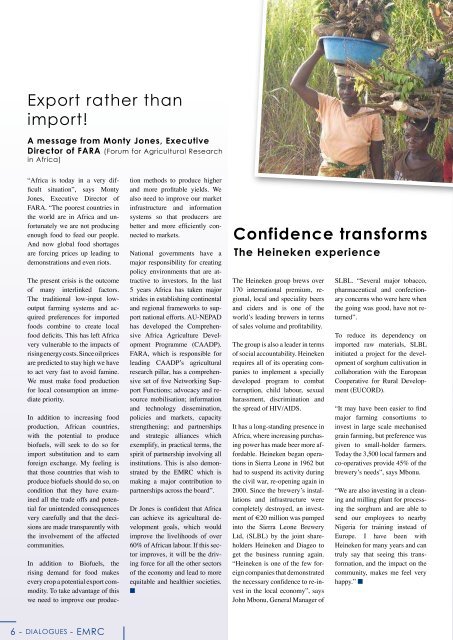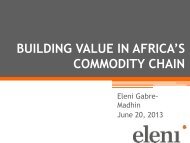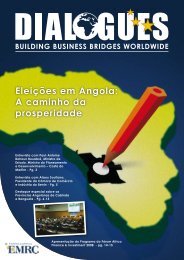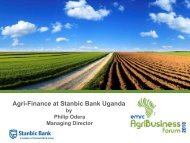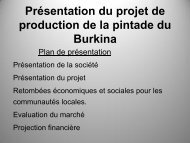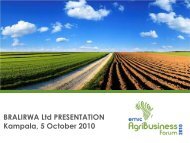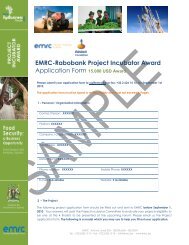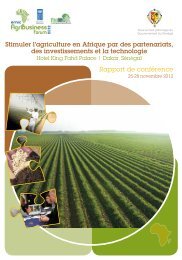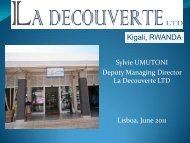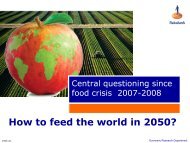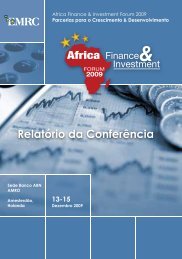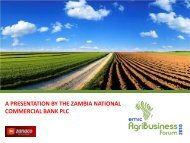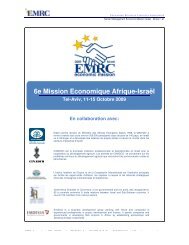Agro-Food Industry as Engine for Growth and Wealth - EMRC
Agro-Food Industry as Engine for Growth and Wealth - EMRC
Agro-Food Industry as Engine for Growth and Wealth - EMRC
Create successful ePaper yourself
Turn your PDF publications into a flip-book with our unique Google optimized e-Paper software.
Export rather than<br />
import!<br />
A message from Monty Jones, Executive<br />
Director of FARA (Forum <strong>for</strong> Agricultural Research<br />
in Africa)<br />
“Africa is today in a very difficult<br />
situation”, says Monty<br />
Jones, Executive Director of<br />
FARA. “The poorest countries in<br />
the world are in Africa <strong>and</strong> un<strong>for</strong>tunately<br />
we are not producing<br />
enough food to feed our people.<br />
And now global food shortages<br />
are <strong>for</strong>cing prices up leading to<br />
demonstrations <strong>and</strong> even riots.<br />
The present crisis is the outcome<br />
of many interlinked factors.<br />
The traditional low-input lowoutput<br />
farming systems <strong>and</strong> acquired<br />
preferences <strong>for</strong> imported<br />
foods combine to create local<br />
food deficits. This h<strong>as</strong> left Africa<br />
very vulnerable to the impacts of<br />
rising energy costs. Since oil prices<br />
are predicted to stay high we have<br />
to act very f<strong>as</strong>t to avoid famine.<br />
We must make food production<br />
<strong>for</strong> local consumption an immediate<br />
priority.<br />
In addition to incre<strong>as</strong>ing food<br />
production, African countries,<br />
with the potential to produce<br />
biofuels, will seek to do so <strong>for</strong><br />
import substitution <strong>and</strong> to earn<br />
<strong>for</strong>eign exchange. My feeling is<br />
that those countries that wish to<br />
produce biofuels should do so, on<br />
condition that they have examined<br />
all the trade offs <strong>and</strong> potential<br />
<strong>for</strong> unintended consequences<br />
very carefully <strong>and</strong> that the decisions<br />
are made transparently with<br />
the involvement of the affected<br />
communities.<br />
In addition to Biofuels, the<br />
rising dem<strong>and</strong> <strong>for</strong> food makes<br />
every crop a potential export commodity.<br />
To take advantage of this<br />
we need to improve our production<br />
methods to produce higher<br />
<strong>and</strong> more profitable yields. We<br />
also need to improve our market<br />
infr<strong>as</strong>tructure <strong>and</strong> in<strong>for</strong>mation<br />
systems so that producers are<br />
better <strong>and</strong> more efficiently connected<br />
to markets.<br />
National governments have a<br />
major responsibility <strong>for</strong> creating<br />
policy environments that are attractive<br />
to investors. In the l<strong>as</strong>t<br />
5 years Africa h<strong>as</strong> taken major<br />
strides in establishing continental<br />
<strong>and</strong> regional frameworks to support<br />
national ef<strong>for</strong>ts. AU-NEPAD<br />
h<strong>as</strong> developed the Comprehensive<br />
Africa Agriculture Development<br />
Programme (CAADP).<br />
FARA, which is responsible <strong>for</strong><br />
leading CAADP’s agricultural<br />
research pillar, h<strong>as</strong> a comprehensive<br />
set of five Networking Support<br />
Functions; advocacy <strong>and</strong> resource<br />
mobilisation; in<strong>for</strong>mation<br />
<strong>and</strong> technology dissemination,<br />
policies <strong>and</strong> markets, capacity<br />
strengthening; <strong>and</strong> partnerships<br />
<strong>and</strong> strategic alliances which<br />
exemplify, in practical terms, the<br />
spirit of partnership involving all<br />
institutions. This is also demonstrated<br />
by the <strong>EMRC</strong> which is<br />
making a major contribution to<br />
partnerships across the board”.<br />
Dr Jones is confident that Africa<br />
can achieve its agricultural development<br />
goals, which would<br />
improve the livelihoods of over<br />
60% of African labour. If this sector<br />
improves, it will be the driving<br />
<strong>for</strong>ce <strong>for</strong> all the other sectors<br />
of the economy <strong>and</strong> lead to more<br />
equitable <strong>and</strong> healthier societies.<br />
■<br />
Confidence trans<strong>for</strong>ms<br />
The Heineken experience<br />
The Heineken group brews over<br />
170 international premium, regional,<br />
local <strong>and</strong> speciality beers<br />
<strong>and</strong> ciders <strong>and</strong> is one of the<br />
world’s leading brewers in terms<br />
of sales volume <strong>and</strong> profitability.<br />
The group is also a leader in terms<br />
of social accountability. Heineken<br />
requires all of its operating companies<br />
to implement a specially<br />
developed program to combat<br />
corruption, child labour, sexual<br />
har<strong>as</strong>sment, discrimination <strong>and</strong><br />
the spread of HIV/AIDS.<br />
It h<strong>as</strong> a long-st<strong>and</strong>ing presence in<br />
Africa, where incre<strong>as</strong>ing purch<strong>as</strong>ing<br />
power h<strong>as</strong> made beer more af<strong>for</strong>dable.<br />
Heineken began operations<br />
in Sierra Leone in 1962 but<br />
had to suspend its activity during<br />
the civil war, re-opening again in<br />
2000. Since the brewery’s installations<br />
<strong>and</strong> infr<strong>as</strong>tructure were<br />
completely destroyed, an investment<br />
of €20 million w<strong>as</strong> pumped<br />
into the Sierra Leone Brewery<br />
Ltd, (SLBL) by the joint shareholders<br />
Heineken <strong>and</strong> Diageo to<br />
get the business running again.<br />
“Heineken is one of the few <strong>for</strong>eign<br />
companies that demonstrated<br />
the necessary confidence to re-invest<br />
in the local economy”, says<br />
John Mbonu, General Manager of<br />
SLBL. “Several major tobacco,<br />
pharmaceutical <strong>and</strong> confectionary<br />
concerns who were here when<br />
the going w<strong>as</strong> good, have not returned”.<br />
To reduce its dependency on<br />
imported raw materials, SLBL<br />
initiated a project <strong>for</strong> the development<br />
of sorghum cultivation in<br />
collaboration with the European<br />
Cooperative <strong>for</strong> Rural Development<br />
(EUCORD).<br />
“It may have been e<strong>as</strong>ier to find<br />
major farming consortiums to<br />
invest in large scale mechanised<br />
grain farming, but preference w<strong>as</strong><br />
given to small-holder farmers.<br />
Today the 3,500 local farmers <strong>and</strong><br />
co-operatives provide 45% of the<br />
brewery’s needs”, says Mbonu.<br />
“We are also investing in a cleaning<br />
<strong>and</strong> milling plant <strong>for</strong> processing<br />
the sorghum <strong>and</strong> are able to<br />
send our employees to nearby<br />
Nigeria <strong>for</strong> training instead of<br />
Europe. I have been with<br />
Heineken <strong>for</strong> many years <strong>and</strong> can<br />
truly say that seeing this trans<strong>for</strong>mation,<br />
<strong>and</strong> the impact on the<br />
community, makes me feel very<br />
happy.” ■<br />
Diageo: Labor, grains<br />
<strong>and</strong> water<br />
Diageo is the world’s leading<br />
premium drinks business, offering<br />
an impressive range of beverages<br />
available worldwide. The<br />
company employs over 23.000<br />
people worldwide with offices<br />
in 80 countries <strong>and</strong> a trading<br />
presence in 180.<br />
Diageo is active in brewing <strong>and</strong><br />
distilling in the majority of sub-<br />
Saharan African countries <strong>and</strong><br />
Nigeria h<strong>as</strong> become the second<br />
largest market <strong>for</strong> Guinness<br />
worldwide. Diageo Africa region<br />
is responsible <strong>for</strong> nearly<br />
one third of Diageo’s net sales<br />
of beer globally <strong>and</strong> its 4.000<br />
employees represent 20% of the<br />
global work<strong>for</strong>ce.<br />
As a business that relies heavily<br />
on agricultural inputs <strong>and</strong> is committed<br />
to the growth of wealth in<br />
Africa, Diageo seeks to exp<strong>and</strong><br />
the link between agriculture <strong>and</strong><br />
development, recognizing that<br />
agriculture can provide opportunities<br />
to address extreme poverty<br />
in Africa. The company is<br />
involved in hundreds of community<br />
activities <strong>and</strong> strives to create<br />
mutually fulfilling relationships<br />
<strong>and</strong> partnerships.<br />
The raw materials used in brewing<br />
include hops, sugar, water<br />
<strong>and</strong> rice <strong>and</strong> especially grains:<br />
barley, sorghum <strong>and</strong> maize. In the<br />
p<strong>as</strong>t these were imported, but new<br />
recipes <strong>and</strong> seed varieties have<br />
been developed, enabling the<br />
use of local barley <strong>and</strong> sorghum.<br />
Specific investments ensure access<br />
to high-yield seeds <strong>as</strong> well<br />
<strong>as</strong> fertilizers <strong>and</strong> herbicides. The<br />
gr<strong>as</strong>s roots business partners are<br />
those who need the income most:<br />
the local small-scale farmers.<br />
Another area of involvement is<br />
the supply of water. The Diageo<br />
program ‘Water of Life’ w<strong>as</strong><br />
launched in 2000, focusing on<br />
the supply of clean drinking water<br />
to people in Africa. It w<strong>as</strong> accelerated<br />
in 2006 under the title<br />
‘1 Million Challenge’ <strong>and</strong> aims to<br />
supply one million people annually<br />
with clean water until 2015.<br />
In 2007 over 840.000 people benefitted<br />
from 38 water <strong>and</strong> sanitation<br />
projects in Kenya, Ug<strong>and</strong>a,<br />
Tanzania, Nigeria, Burkino F<strong>as</strong>o,<br />
Ethiopia, Cameroon, Ghana <strong>and</strong><br />
South Africa. The projects are<br />
b<strong>as</strong>ed on local needs, low cost<br />
solutions <strong>and</strong> available technologies<br />
<strong>and</strong> are carried out in close<br />
collaboration with local governments,<br />
NGOs <strong>and</strong> community<br />
organizations. ■<br />
“All is not doom<br />
<strong>and</strong> gloom”<br />
FAO calls <strong>for</strong> urgent action on<br />
food security<br />
“With respect to the present<br />
international crisis in food supply<br />
<strong>and</strong> food prices, it is to the<br />
credit of the FAO that we alerted<br />
the world to the need <strong>for</strong> urgent<br />
action in June 2007”, says Nick<br />
Parsons, Director, Communications<br />
Division of the FAO. “We<br />
are all the more happy that food<br />
security w<strong>as</strong> high on the agenda<br />
at the recent G8 summit in Japan.<br />
On this occ<strong>as</strong>ion Robert<br />
Zoellich, President of the World<br />
Bank, stated ‘What we are witnessing<br />
is not a natural dis<strong>as</strong>ter<br />
– a silent tsunami (…) It is<br />
a man-made cat<strong>as</strong>trophe <strong>and</strong> <strong>as</strong><br />
such must be fixed by people’.<br />
Indeed: people - governments,<br />
international institutions <strong>and</strong><br />
private enterprises - need to take<br />
note <strong>and</strong> take action, get the priorities<br />
right <strong>and</strong> make the inevitable<br />
commitments <strong>and</strong> investments.<br />
The challenge is that this is a<br />
complex issue, requiring solid,<br />
long term strategies, but the<br />
good news is that the problem<br />
can become the solution. Precisely<br />
because food prices are<br />
high, this thing can be turned<br />
around <strong>and</strong> become an opportunity.<br />
As we all know, investors<br />
are attracted to are<strong>as</strong> where there<br />
is some guarantee of returns!<br />
And there is money to be made<br />
in investments all along the food<br />
chain – from healthy planting<br />
material, irrigation <strong>and</strong> fertilization<br />
to packaging <strong>and</strong> distribution.<br />
We need to be creative, take<br />
a holistic view of the situation<br />
<strong>and</strong> look at what can be gained.<br />
Despite the urgency, all is certainly<br />
not doom <strong>and</strong> gloom”.<br />
On the issue of local versus<br />
global markets, the general consensus<br />
is that in countries where<br />
there is the most poverty <strong>and</strong><br />
malnutrition, the priority should<br />
be to improve the livelihood of<br />
local populations, both rural <strong>and</strong><br />
urban, be<strong>for</strong>e looking to export.<br />
To achieve this, however, more<br />
investment is needed in storage<br />
facilities <strong>and</strong> transport infr<strong>as</strong>tructure.<br />
The present loss of harvests at<br />
local <strong>and</strong> regional levels – up to<br />
50% in some countries in Africa<br />
– needs to be turned around. This<br />
means that local government<br />
policies should favour these<br />
are<strong>as</strong> of development.<br />
It goes without saying that good<br />
governance is essential to attract<br />
private sector investment. Noone<br />
can be expected to invest<br />
without <strong>as</strong>surances that their<br />
money will reach its destination<br />
<strong>and</strong> do the job it is meant<br />
<strong>for</strong>! Private Public Partnerships<br />
bring good results in many c<strong>as</strong>es,<br />
but partnerships between countries<br />
also look very promising.<br />
For instance: between countries<br />
that have abundant arable l<strong>and</strong><br />
but no money <strong>and</strong> those that<br />
have no arable l<strong>and</strong>, but strong<br />
financial resources.<br />
“Facilitating such partnerships<br />
is where the <strong>EMRC</strong> can<br />
play a key role”, says Mr Parsons.<br />
“The bottom line is: no<br />
one country can fix the problem<br />
alone, but if we tackle this together<br />
the results can be terrific!<br />
The international community<br />
should not see developing countries<br />
<strong>as</strong> receivers of charity, but<br />
<strong>as</strong> l<strong>and</strong>s of opportunity” ■<br />
- DIALOGUES - <strong>EMRC</strong><br />
Quarterly - Summer 2008 -


